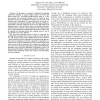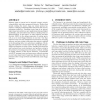355 search results - page 49 / 71 » A Unified Fault-Tolerance Protocol |
LCN
2006
IEEE
14 years 1 months ago
2006
IEEE
— In this paper, we present a distributed computing framework designed to support higher quality of service and fault tolerance for processing deadline-driven tasks in a P2P envi...
AINA
2004
IEEE
13 years 11 months ago
2004
IEEE
Peer-to-peer (P2P) computing offers many attractive features, such as self-organization, load-balancing, availability, fault tolerance, and anonymity. However, it also faces some ...
CEAS
2008
Springer
13 years 9 months ago
2008
Springer
The increasing use of email for phishing and unsolicited marketing has reduced the trustworthiness of email as a communication medium. Sender authentication is a known defense aga...
CONEXT
2009
ACM
13 years 8 months ago
2009
ACM
Software bugs in routers lead to network outages, security vulnerabilities, and other unexpected behavior. Rather than simply crashing the router, bugs can violate protocol semant...
ISCA
2011
IEEE
12 years 11 months ago
2011
IEEE
As we move to large manycores, the hardware-based global checkpointing schemes that have been proposed for small shared-memory machines do not scale. Scalability barriers include ...


